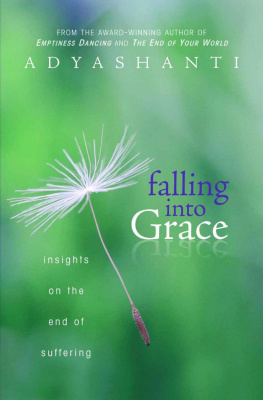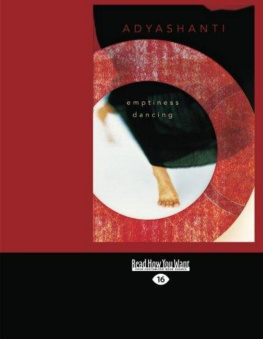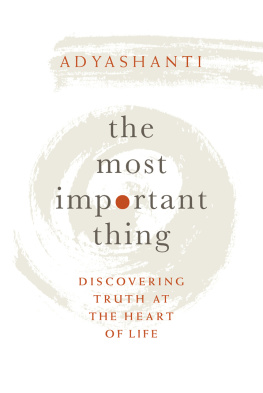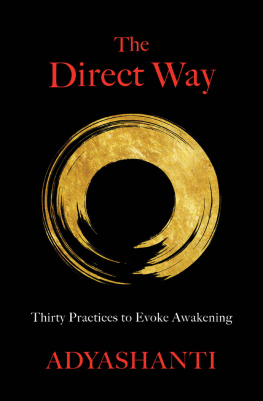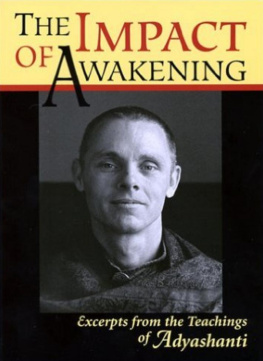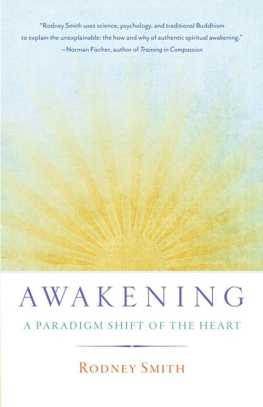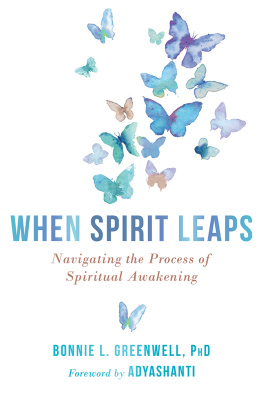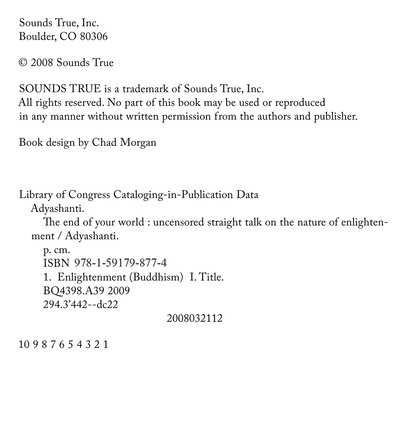A warm thanks to Tami Simon. Without your prodding and encouragement, this book would never have happened. Your openness and trust as well as your great editing skills are exceeded only by your love of the dharma. Another warm thanks to Kelly Notaras for your fine and patient editing.
Editors Introduction
When I first met Adyashanti in the Fall of 2004, I was struck by the original and fresh way he taught about spiritual awakening. Although he honored his Zen lineage, he emphasized the importance of not relying on a specific teacher or method for realization. Instead, he talked about how important it is to look to our own direct experience and fearlessly explore the territory of our own lives. He also insisted that it is a myth that spiritual awakening is a rare phenomenon available only to a select fewsuch as people who have meditated in caves for decades or who wear special robes. He went further to say that this myth about the rarity of awakening can actually be an obstacle to our own process of discovery, because we believe in a limitation that is not real but self-imposed.
In retrospect, I think Adya (as he is called by friends and students) was speaking from the perspective of someone sitting atop the crest of a wave: a wave that is beginning to break in our lifetime. As Adya points out in Chapter 1, more and more people with varied backgrounds and histories of religious experience are beginning to describe spiritual awakeningan unshakable realization that who we are is the oneness of lifeas the most important transformation of their lives. In the past few years, there appears to have been a shift in the collective perception of what is possible; spiritual awakening is no longer the domain of elite practitioners, but is suddenly within the reach of all of us.
As a publisher who has been making spiritual wisdom teachings available for over two decades, I am both thrilled about this new wave of interest in awakening and a bit concerned about the potential confusion, misunderstandings, and distortions that often accompany the idea of realization. To begin with, people mean very different things by the term spiritual awakening. I often wonder if people understand not only what is gained through this process, but alsoand perhaps more importantwhat is lost. Additionally, as spiritual awakening has become more and more popularized, I have seen many people talk about their awakening from an ego perspective, co-opting the claim of awakening to somehow feel better and more awake than other people. But what troubles me the most is the number of people who deny anything in their experiencebe it anger, depression, or family troublethat contradicts their idea of what it means to be an awakened person.
A little over a year ago, I was on the telephone with Adya, complaining about this phenomenonabout meeting so many people who seemed to misunderstand spiritual awakening and who are actually distancing themselves from their moment-to-moment experience in the name of being awake. Adya mentioned that he was actually lecturing quite a bit on just this very topicon the misconceptions, pitfalls, and delusions that can occur after an initial experience of spiritual awakening. I immediately and with great enthusiasm asked Adya if he would deliver a series of talks on this topic so that Sounds True could publish these teachings in both audio and text form. He agreed, and the result is The End of Your World: Uncensored Straight Talk on the Nature of Enlightenment.
As Adya states in Chapter 1, there are very few resources available for people who have had an initial experience of spiritual awakening and want to understand how the process continues and unfolds. May this book be a helpful guide and further catalyst for this greatest of adventures.
Tami Simon
Publisher, Sounds True
June 2008
Boulder, Colorado
CHAPTER ONE
Exploring Life After Awakening
Theres a phenomenon happening in the world today. More and more people are waking uphaving real, authentic glimpses of reality. By this I mean that people seem to be having moments where they awaken out of their familiar senses of self, and out of their familiar senses of what the world is, into a much greater realityinto something far beyond anything they knew existed.
These experiences of awakening differ from person to person. For some, the awakening is sustained over time, while for others the glimpse is momentaryit may last just a split second. But in that instant, the whole sense of self disappears. The way they perceive the world suddenly changes, and they find themselves without any sense of separation between themselves and the rest of the world. It can be likened to the experience of waking up from a dreama dream you didnt even know you were in until you were jolted out of it.
In the beginning of my teaching work, most of the people who came to me were seeking these deeper realizations of spirituality. They were seeking to wake up from the limiting and isolated senses of self they had imagined themselves to be. Its this yearning that underpins all spiritual seeking: to discover for ourselves what we already intuit to be truethat there is more to life than we are currently perceiving.
But as time has passed, more and more people are coming to me who have already had glimpses of this greater reality. It is because of them that I am giving the teachings in this book.
The Dawning of Awakening
This discovery Im talking about is traditionally referred to as spiritual awakening, because one awakens from the dream of separation created by the egoic mind. We realizeoften quite suddenlythat our sense of self, which has been formed and constructed out of our ideas, beliefs, and images, is not really who we are. It doesnt define us; it has no center. The ego may exist as a series of passing thoughts, beliefs, actions, and reactions, but in and of itself it has no identity. Ultimately all of the images we have about ourselves and the world turn out to be nothing but a resistance to things as they are. What we call ego is simply the mechanism our mind uses to resist life as it is. In that way, ego isnt a thing as much as it is a verb. It is the resistance to what is. It is the pushing away or pulling toward. This momentum, this grasping and rejecting, is what forms a sense of a self that is distinct, or separate, from the world around us.
But with the dawn of awakening, this outside world begins to collapse. Once we lose our sense of self, its as if we have lost the whole world as we knew it. At that momentwhether that moment is just a glimpse or something more sustainedwe suddenly realize with incredible clarity that what we truly are is in no way limited to the small sense of self that we thought we were.
Awakening to truth or reality is something that is very hard to talk about because it is transcendent of speech. It is helpful, nevertheless, to work with some sort of a guidepost. The simplest thing one can say about the experiential knowledge of awakening is that it is


